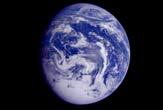Global Warming or Just Hot Air? A Dozen Different Views

Earth's temperature has increased by about 1 degree Fahrenheit (0.56 degrees Celsius) in the last century. Most of the warming in the last 50 years is attributed to human activities, according to the U.S. Environmental Protection Agency.
Goldilocks and the Greenhouse What makes Earth habitable? This LiveScience original video explores the science of global warming and explains how, for now, conditions here are just right.
However, climate change has gone from being a scientific actuality to a political wedge issue, used as a cudgel by parties of all persuasions to point fingers and score points. Consequently, many people, including scientists and politicians, can’t seem to arrive at agreement on the issue.
LiveScience recently reached out to several experts and visionaries for their views on this controversial topic and dug up published comments of others.
Here we present a spectrum of opinions and concerns ranging from the importance of climate change being "grossly exaggerated" to "If President Bush could jump in a time machine and experience a single day in 2056, he'd return to the present shocked and awed."
Jim Hansen, director of NASA'S Goddard Institute for Space Studies, in an email interview:
"The argument about whether there is global warming is over. It is now clear that, for thirty years, we have been in a strong global warming trend at a rate of about 0.2 Celsius per decade for the past 30 years, [meaning] there has been 1 degree Fahrenheit (0.56 degrees Celsius) global warming in the past 30 years. The Earth is now at its warmest level in the period of instrumental data, that is, since the late 1800s."
Naomi Oreskes, associate professor of history and director of the Program in Science Studies at the University of California, San Diego in an editorial piece in The Washington Post in 2004:
Get the world’s most fascinating discoveries delivered straight to your inbox.
"Many people have the impression that there is significant scientific disagreement about global climate change. It's time to lay that misapprehension to rest. There is a scientific consensus on the fact that Earth's climate is heating up and human activities are part of the reason. We need to stop repeating nonsense about the uncertainty of global warming and start talking seriously about the right approach to address it.
"The basic picture is clear, and some changes are already occurring. A new report by the Arctic Climate Impact Assessment—a consortium of eight countries, including Russia and the United States—now confirms that major changes are taking place in the Arctic, affecting both human and non-human communities, as predicted by climate models."
Christine Rogers, senior research scientist, Harvard School of Public Health, Harvard University, in an email interview:
"The impacts of the changes the climate scientists are predicting are being tested in a number of systems. For plants, it seems that elevated levels of CO2 [carbon dioxide] will increase plant biomass, water use efficiency, and reproductive effort. Some experiments have shown that this includes an increase in pollen production. Since some plants have pollen that is highly allergenic, this could mean increased exposure to allergens and an increase in illness for those who are pollen allergic.
"It remains to be seen whether this increased exposure will also cause an increase in the number of people with allergic disease."
Paul Epstein, associate director of the Center for Health and the Global Environment at Harvard Medical School, in an email interview:
"The most coherent explanation is that climate is changing because of burning of fossil fuels and felling forests. The health, environmental, and economic costs of inaction are rapidly becoming unmanageable. Stabilizing the climate will require a clean energy transition that will also benefit public health, improve energy security, and can become the engine of economic growth for this 21st century.
"We're seeing changes in asthma, heat wave deaths, and the spread of infectious diseases that are indicative of enormous changes affecting the environment. Climate and disease are stalking humans, wildlife, agriculture, forests, and marine habitat; which are our life support systems."
David Archer, professor in the Department of the Geophysical Sciences from the University of Chicago, in an email interview:
"The warming of the past several decades has been faster and risen to higher temperatures in the past decades than has been seen in thousands of years. Rising CO2 [carbon dioxide] levels can easily explain the warming, but there is no alternative explanation that does not involve rising CO2 or predict further warming. Scientists have done their job, it is time now to confront the reality of human-induced climate change resulting from emission of CO2 from fossil fuel consumption."
Kurt M. Cuffey, professor of geography at the University of California in Berkeley, in an editorial for The San Francisco Chronicle in 2005.
"When we look at the complex environmental systems of our planet, from climate to the polar ice sheets, there will always be lingering uncertainties, and some surprises probably await us. But in the thorough and convincing rebuttal of the last contrary arguments, we have just witnessed a historically important validation of the scientific evidence for human causation of climate warming. And Katrina and the waning polar ice caps remind us how important this is.
"It is time for remaining skeptics to look at the tear-streaked faces of refugees from New Orleans, as well as the startling map of ice shrinkage around the North Pole, and begin to plan for the future."
((ImgTag||right|null|null|null|false))
Patrick J. Michaels, professor of Natural Resources, Virginia Tech, State Climatologist for Virginia in an email interview:
"In climate science, we only have two things: data (the past) and models or hypotheses (the future). The data show us that distribution of warming since the mid-1970s is consistent with what one would expect from an enhanced carbon dioxide-related greenhouse effect. The ensemble behavior of our models is that, once this warming is initiated, it tends to take place at a constant (rather than an ever-increasing) rate. Indeed this has been the case for the last three decades.
"Consequently we know, with considerable confidence, the rate of warming for the policy-foreseeable future, and it is about 0.85 degrees Celsius, [1.53 degrees Fahrenheit] per half-century. This is near the low end of projections made by the United Nations. However, there is no known suite of technologies that can affect this rate significantly, so the proper policy is to invest in the future rather than to waste money today in a futile attempt to significantly reduce warming."
Daniel Gilbert, professor of psychology at Harvard University in Op-Ed section of The Los Angeles Times earlier this month:
"Because we barely notice changes that happen gradually, we accept gradual changes that we would reject if they happened abruptly.
"Environmentalists despair that global warming is happening so fast. In fact, it isn't happening fast enough. If President Bush could jump in a time machine and experience a single day in 2056, he'd return to the present shocked and awed, prepared to do anything it took to solve the problem.
"The human brain is a remarkable device that was designed to rise to special occasions. We are the progeny of people who hunted and gathered, whose lives were brief and whose greatest threat was a man with a stick. When terrorists attack, we respond with crushing force and firm resolve, just as our ancestors would have. Global warming is a deadly threat precisely because it fails to trip the brain's alarm, leaving us soundly asleep in a burning bed.
"It remains to be seen whether we can learn to rise to new occasions."
More to Explore: The Controversy
- VIDEO: Goldilocks and the Greenhouse
- Global Warming Differences Resolved
- Conflicting Claims on Global Warming and Why It's All Moot
- Baffled Scientists Say Less Sunlight Reaching Earth
- Scientists Clueless over Sun's Effect on Earth
- Greenhouse Gas Hits Record High
- Key Argument for Global Warming Critics Evaporates
The Effects
- Seas Rise
- More Wildfires
- Deserts to Grow
- Greenland Melts
- Ground Collapses
- Glaciers Disappear
- Allergies Get Worse
- Animal DNA Changing
- Animals Change Behavior
- Rivers Melt Sooner in Spring
- Increased Plant Production
- Hurricanes Get Stronger
- Lakes Disappear
The Possibilities
- More Rain but Less Water
- Ice-Free Arctic Summers
- Overwhelmed Storm Drains
- Worst Mass Extinction Ever
- A Chilled Planet
Strange Solutions
 Live Science Plus
Live Science Plus







